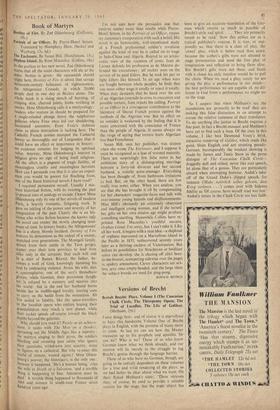Versions of Brecht
Berton Brecht: Plays, Volume I (The Caucasian Chalk Circle, The Threepenny Opera, The Trial of Lacunas, The Life of Galileo). (Methuen, 25s.)
FIRST things first: and of course it is marvellous to have this handsome Volume One of Brecht plays in English, with the promise of many more to come. At last we can see how the Master measures up to his prophets and apostles. Or can we? Who is we? Those of us who know German know what we think already, and our interest will lie merely in the struggle to lug Brecht's genius through the language barrier.
Those of us who have no German, though, are going to be entirely dependent on these volumes for a true and vivid rendering of the plays; so we had better be clear about what we want. On their flyleaf Methuen's state: 'These versions may. of course, be used to provide a suitable version for thc stage, but the main object has been to give an accurate translation of the Ger- man which retains as much as possible of Brecht's style and spirit. .. . They are primarily meant to be read.' Now this strikes me as a typical publisher's evasion. It is true, or sup- posedly so, that there is a class of play, the 'closet' play, which is better read than acted, because the author's gifts were not attuned to stage presentation and need the free play of imagination and reflection to bring them alive. But Brecht's gifts were not these, and faced with a closet his only reaction would be to pull the chain. When we read a play, surely we are giving the play a performance in our minds-- the best performance we arc capable of, no dif- ferent in kind from a performance we might sec on the stage.
So I suspect that when Methuen's say the translations arc 'primarily to be read' they are making this false distinction in an attempt to excuse the relative tameness of their translators. To do anything like justice to Brecht requires a fine poet, in fact a Brecht tnanque, and Methilen's have yet to find such a man. Of the ones in this' volume, I like best Desmond Vesey's brisk, attractive rendering of Galileo, which reads like good, blunt English and not strutting pseudo- German. Incomparably the weakest showing is made by James and Tania Stern in the prose dialogue of The Caucasian Chalk Circle— doggedly dull and stilted, never like real speech, let alone that of a genius. They are particularly absurd when attempting humour. Azdak's take- off of the Grand Duke's clipped speech, for instance ('llabe natiirlich selber gelesen, dass Krieg verloren . . ..) comes over with hideous fidelity as 'Of course, have myself read war lost.' Auden's verses in the Chalk Circle arc less faith-
ful but very elegant. Vesey is more Brechtian: Mary, Mary sat her down Had a little old pink gown Gown was shabby and bespattered But when chilly winter came Gown went round her just the same Bespattered don't mean tattered.
On the whole, though, Methuen's must be more demanding. A tame version of Brecht is not an accurate version, however literally faith- ful. Surely there are good writers of Brecht's temper who could make a better job of it than most of those in Volume One; writers with sharp- ness, warmth and a humour that can slam or slice as Brecht could. Above all, the plays must have a rhythm of their own in English. I refuse to believe that it can't be done.
7. 14. TULLY



































 Previous page
Previous page